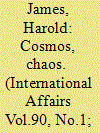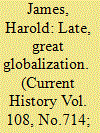|
|
|
Sort Order |
|
|
|
Items / Page
|
|
|
|
|
|
|
| Srl | Item |
| 1 |
ID:
131414


|
|
|
|
|
| Publication |
2014.
|
| Summary/Abstract |
The article explores parallels between the fragility of globalization on the eve of the First World War, in the aftermath of the financial crisis of 1907, and today's crisis of globalization following the post-2007 recession. The fragility and interconnectedness of the international economy in both cases could provide a basis for an economic-military strategy. The temptation of using economic connectedness as a substitute for conventional and costly military strategy makes this course particularly attractive to a hegemon-the UK then, the US now-that is facing powerful competition from rising powers (Germany and the US then, China now). The challengers are likely to find their own alternative strategy, and the result breeds uncertainty. In consequence, rule-based international orders are generally strained by transitions of power, even though all the parties see the desirability and need for a common system of rules
|
|
|
|
|
|
|
|
|
|
|
|
|
|
|
|
| 2 |
ID:
077694


|
|
|
| 3 |
ID:
081739


|
|
|
|
|
| Publication |
2008.
|
| Summary/Abstract |
Three controversial concepts are central to discussion on how international order originates, how it operates, and ultimately how we should respect it: globalization, empire and natural law. Each of these is examined in turn in this article. The currently prevalent way of thinking about globalization simply as a system of inter-connections, of processes and networks that span national and cultural boundaries is likely to produce anti-globalization backlashes. Many people reach the conclusion that global rules are simply a euphemism for some sort of imperial or neo-imperial rule. Consequently, there is an increasingly intense discussion of the role of force and power in a global order. This article suggests an alternative mechanism for creating global order. The power of globalization rests not simply on material prosperity, but on the ability to communicate and share ideas as well as goods across large geographical and cultural distances. Natural law theories suggest that a sustained dialogue between apparently rival traditions of thinking can lead to agreement on shared norms and values.
|
|
|
|
|
|
|
|
|
|
|
|
|
|
|
|
| 4 |
ID:
187646


|
|
|
|
|
| Summary/Abstract |
In what ways can there be a learning from the past in the case of financial crises? A short-run assessment looks frequently different to a longer retrospective: policies that once appeared to be the best available turn out to be counter-productive. The article tackles this issue by examining three iconic and world-changing cases of financial crisis: 1931, 1997 and 2008. In each, it looked at first as if there was a substantial success, because the measures adopted corresponded to conventional wisdom. But those immediate responses, in each case driven by the sense that past mistakes needed to be avoided, in the end unfortunately set the stage for a new set of problems, and thus for the next crisis. Even though multilateral solutions might have been the best answer, the concrete dynamics of responding to crises politically produces national solutions, which may drive a nationalization of politics. The immediate and conventional solutions did not adequately deal with the social and political fallout from increasing disillusion with the way that the solutions are applied, and with the (in part) unintended consequences they produce. The side-effects of anti-crisis medicine are thus unpleasant and liable to generate new tensions.
|
|
|
|
|
|
|
|
|
|
|
|
|
|
|
|
| 5 |
ID:
105436


|
|
|
|
|
| Publication |
2011.
|
| Summary/Abstract |
The Great Recession has brought a structural break in international economic and political order. The geography of power is at present being dramatically transformed, notably by the rapid economic rise of China. What makes international order legitimate in a world in which political and economic foundations are rapidly shifting? This article examines analogies and lessons from a previous transition, from a world order centered on Britain, to a US dominated global order. That transition saw two moments of crisis, or turning points, the 1931 financial crisis at the height of the Great Depression, and the diplomatic and military catastrophe of Suez. The article looks at two interpretations of the transition, one by E. H. Carr focusing on the destruction in the Great Depression of a liberal economic and political order and its replacement by a world of brutal Great Power politics; the other by Charles Kindleberger, stressing the need for a benevolent hegemonic power to provide public goods for the world economy and the world political system. China is beginning to behave in the way expected of a Kindleberger hegemon, but also sees the possibilities of asserting power in a world that in the aftermath of 2008 looks much more like the chaotic and crisis-ridden interwar period as interpreted by E. H. Carr. The challenge for the management of the new international order will lie in the ability of China to embrace the universalistic vision that underpinned previous eras of stability, in the nineteenth century and in the late twentieth century.
|
|
|
|
|
|
|
|
|
|
|
|
|
|
|
|
| 6 |
ID:
085489


|
|
|
| 7 |
ID:
032743


|
|
|
|
|
| Publication |
London, Leo Cooper, 1971.
|
| Description |
xviii, 201p.: ill.hbk
|
| Standard Number |
0850520800
|
|
|
|
|
|
|
|
|
|
|
|
Copies: C:1/I:0,R:0,Q:0
Circulation
| Accession# | Call# | Current Location | Status | Policy | Location |
| 007884 | 959.8036/JAM 007884 | Main | On Shelf | General | |
|
|
|
|
|
|
|
|
|